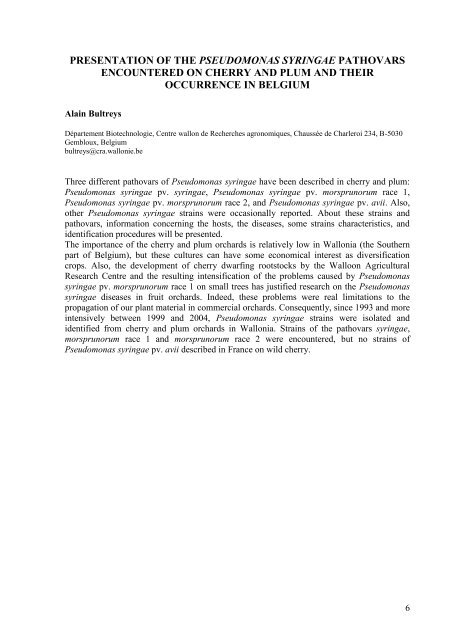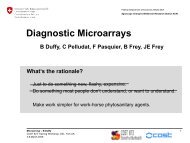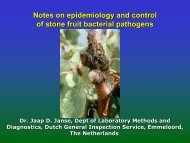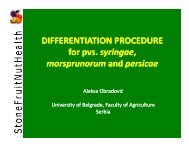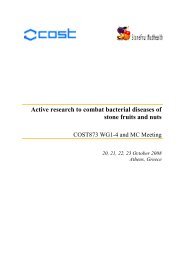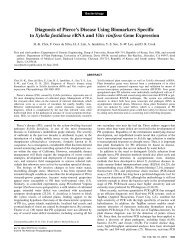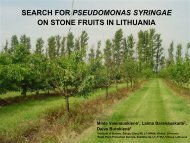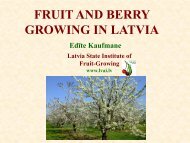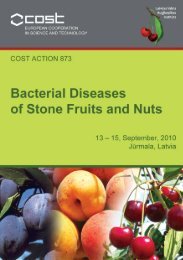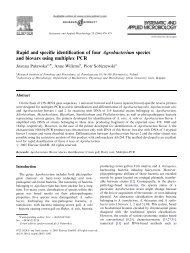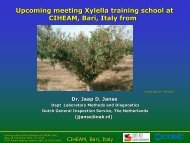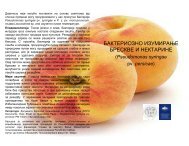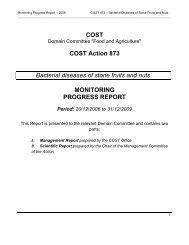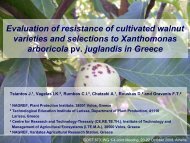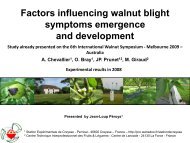PRESENTATION OF THE PSEUDOMONAS SYRINGAE PATHOVARSENCOUNTERED ON CHERRY AND PLUM AND THEIROCCURRENCE IN BELGIUMAlain BultreysDépartement Biotechnologie, Centre wallon de Recherches agronomiques, Chaussée de Charleroi 234, B-5030Gembloux, Belgiumbultreys@cra.wallonie.beThree different pathovars of <strong>Pseudomonas</strong> syringae have been described in cherry and plum:<strong>Pseudomonas</strong> syringae pv. syringae, <strong>Pseudomonas</strong> syringae pv. morsprunorum race 1,<strong>Pseudomonas</strong> syringae pv. morsprunorum race 2, and <strong>Pseudomonas</strong> syringae pv. avii. Also,other <strong>Pseudomonas</strong> syringae strains were occasionally reported. About these strains andpathovars, information concerning the hosts, the diseases, some strains characteristics, andidentification procedures will be presented.The importance of the cherry and plum orchards is relatively low in Wallonia (the Southernpart of Belgium), but these cultures can have some economical interest as diversificationcrops. Also, the development of cherry dwarfing rootstocks by the Walloon AgriculturalResearch Centre and the resulting intensification of the problems caused by <strong>Pseudomonas</strong>syringae pv. morsprunorum race 1 on small trees has justified research on the <strong>Pseudomonas</strong>syringae diseases in fruit orchards. Indeed, these problems were real limitations to thepropagation of our plant material in commercial orchards. Consequently, since 1993 and moreintensively between 1999 and 2004, <strong>Pseudomonas</strong> syringae strains were isolated andidentified from cherry and plum orchards in Wallonia. Strains of the pathovars syringae,morsprunorum race 1 and morsprunorum race 2 were encountered, but no strains of<strong>Pseudomonas</strong> syringae pv. avii described in France on wild cherry.6
OCCURRENCE OF PSEUDOMONAS SYRINGAE PATHOVARS INSTONE FRUITS IN THE NETHERLANDS AND AVAILABILITY OFSTRAINS FROM DIFFERENT HOSTS OF THIS PATHOGEN.Jaap D. Janse 1) , Alexander van Beuningen 2) and Marcel Wenneker 3)1)2)3)Dutch General Inspection Service, Dept of Laboratory Methods and Diagnostics, PO Box 1115, 8300BC, Emmeloord, The NetherlandsDept. of Bacteriology, Plant Protection Service, PO Box 9102, 6700HC Wageningen, The NetherlandsApplied Plant Research, Research Unit Fruit, PO Box 200, 6670 AE Zetten, the Netherlands.Stone fruit production in the Netherlands is mainly plum, cherry and sour cherry (yearly c.300 ha for each crop). This is much smaller than apple (c. 9500 ha) and pear (c. 7000 ha).Cultivation of peach and almond under glass has almost disappeared and these species aremainly found as solitary trees near farms and in private gardens. There is an ongoing tendencyto replace old, extensive orchards by intensive ones using weak rootstocks, especially in theplum cultivation. Important varieties for sweet cherry are Regina, Lapins and Kordia withLimburgse boskriek (Prunus avium), Gisela 5 and Colt as rootstock; for sour cherry Kellerisand Morellen and for plum Reine Victoria and Opal with VVA-1, St-Julien-A and Ferlenainas rootstocks. Bacterial canker (caused by <strong>Pseudomonas</strong> syringae pv. mor-prunorum, Pmp)and <strong>Pseudomonas</strong> syringae pv. syringae, Pss) are common and long known diseases in theNetherlands. Pss was originally described from our country by van Hall on lilac (Syringavulgaris) in 1902. Pmp was already reported in peach and cherry under glass in 1947 Pmpbecame a problem in the 1950’s. Bacterial canker was extensively studied by A. Fuchs incherry, plum and peach. At that time he was not able to separate clearly Pmp and Pss. Someof his strains (now classified as Pss and Pmp) are still present in international collections.Fuchs and coworkers found that field resistance of the three cherry species used, P. avium, P.cerasus and P. avium × P. cerasus, towards bacterial canker was low, high and very high,respectively. In recent years bacterial canker in plum is increasingly present, especially onyoung, vigorously growing trees of plum. Symptoms are yellowing of leaves, cankerformation on trunk and larger branches, gum formation and death of branches and eventuallydeath of the whole tree. The rootstock often remains healthy. Pss and to a lesser extend Pmpcould repeatedly be isolated from these species over the years. Pmp seems to be morecommon on cherry, a similar situation as was observed in Belgium. In many cases nodefinitive diagnosis of bacterial canker is made, it is a common and accepted problem.Control measures are cultivation methods on planting site (such as optimal water household,cover of soil with organic material), (careful) pruning, hygiene and removal/burning ofseverely infected trees. Prophylactic sprays with antibiotics or copper are not allowedanymore. In some severe cases more that 50% of trees are infected. The situation in plumtends to develop towards a more severe disease situation in new cultivars on weak rootstocksas already observed in Germany, Austria and Switzerland. P.s. pv. persicae, P.s. pv.cerasicola, P. amygdali and X. campestris pv. pruni have never been detected in theNetherlands. For the latter quarantine bacterium there is a potential risk of establishmentwhen climatic changes to warmer temperatures would be persistent and when new cherryvarieties on weak rootstocks are grown under cover. A number of strains of both Pmp and Pssfrom plum, sour cherry and sweet cherry are available from the PD Collection (Culturecollection of the Plant Protection Service, Wageningen, The Netherlands) and details aboutthese strains will be provided. Pmp strains have never been identified to race level in theNetherlands and diffentiation of Pmp and Pss is based in biochemical tests. A large number ofstrains of Pss from many different hosts are available in the PD collection for comparison andtaxonomic studies. Details on these strains will also be provided.7


